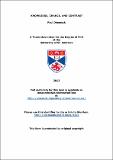Knowledge, chance, and contrast
Abstract
The late 1980s and early 1990s saw the rise of contextualist theories of knowledge
ascriptions (and denials). Contextualists about ‘knows’ maintain that utterances of the
form ‘S knows p’ and ‘S doesn’t know p’ resemble utterances such as ‘Peter is here’
and ‘Peter is not here’, in the sense that their truth-conditions vary depending upon
features of the context in which they are uttered. In recent years, contextualism about
‘knows’ has come under heavy attack. This has been associated with a proliferation of
defences of so-called invariantist accounts of knowledge ascriptions, which stand
united in their rejection of contextualism.
The central goal of the present work is two-fold. In the first instance, it is to bring out
the serious pitfalls in many of those recent defences of invariantism. In the second
instance, it is to establish that the most plausible form of invariantism is one that is
sceptical in character. Of course, the prevailing preference in epistemology is for non-
sceptical accounts. The central conclusions of the thesis might therefore be taken to
show that – despite recent attacks on its plausibility – some form of contextualism
about ‘knows’ must be correct. However, this project is not undertaken without at
least the suspicion that embracing (a particular form of) sceptical invariantism is to be
preferred to embracing contextualism. In the course of the discussion, I therefore not
only attempt to rebut some standard objections to sceptical invariantism, but also to
reveal – in at least a preliminary way – how the sceptical invariantist might best argue
for the superiority of her account to that of the contextualist.
Type
Thesis, PhD Doctor of Philosophy
Collections
Items in the St Andrews Research Repository are protected by copyright, with all rights reserved, unless otherwise indicated.

